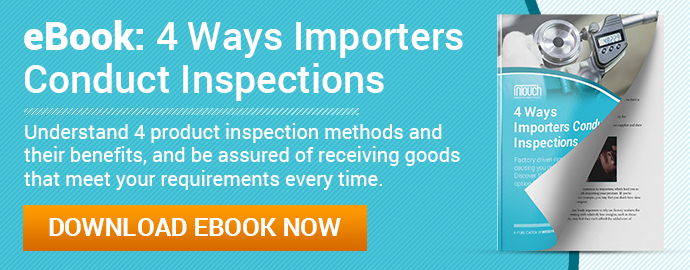 Do you feel like you’re never on the same wavelength with your suppliers? Do you feel like you’re always rushing to meet customer deadlines or working damage control to resolve issues quickly and avoid last-minute catastrophes?
Do you feel like you’re never on the same wavelength with your suppliers? Do you feel like you’re always rushing to meet customer deadlines or working damage control to resolve issues quickly and avoid last-minute catastrophes?
Stronger supplier relationships don’t just help you import products smoothly. Many importers find it difficult to work with their own suppliers, so developing a good relationship can also give you a real competitive edge. And cultivating a healthy partnership with a supplier isn’t as difficult as it may seem. It just takes some familiarity with a few guiding principles to form a stronger link in your supply chain.
Here are three tips for stronger supplier relationships:
1. Pay on time
This first tip for stronger supplier relationships should go without saying. Still, there are importers from all different backgrounds and industries that fail to pay their suppliers by the agreed upon time.
Factories and trading companies run a for-profit business. Like importers, they have concerns about getting paid. They prefer to maintain positive cash flows. And, perhaps most importantly, they rely on steady, dependable payments from customers in order to pay their own suppliers for components required for production. Defaulting on payment to their suppliers could lead to a full stop in their operations.
Setting clear and achievable payment terms
Agreed upon payment terms should be confirmed well before placing the order. If you foresee that you might have problems meeting your obligations, it’s best to work  out favorable contract terms before signing a contract. Being open and honest about payment early on allows the supplier to plan more effectively and helps build trust.
out favorable contract terms before signing a contract. Being open and honest about payment early on allows the supplier to plan more effectively and helps build trust.
If something unexpected happens and you cannot pay your supplier, reach out directly and inform them of the situation. Don’t make the mistake of waiting for your supplier to contact you about an overdue invoice. Your supplier will be much happier to get a call or message from you letting them know:
- You’re aware of the outstanding fee and
- When you plan to send payment.
Once you’ve established a credible relationship with your supplier, you can discuss more favorable payment terms for your orders so that late payment becomes a less frequent issue.
2. Communicate frequently, openly and directly
Difficulty communicating with suppliers is one of the most common challenges importers face. But what some importers don’t realize is that the way they communicate is often more to blame for misunderstandings than any language barrier.
Visit the supplier early in the relationship
It’s not always going to be reasonable, or necessary, for you to visit a supplier's facility. But it never hurts to meet your supplier representative face-to-face at the start of working together. Getting to know the people that will be fulfilling your order helps build rapport and makes for stronger supplier relationships. Even if you can’t personally meet supplier contacts to see how they operate, you might want to consider sending a trusted agent to visit on your behalf (related: 5 Tips for Visiting Factories in China).
Don’t rely on email alone to communicate with your supplier
So many importers rely solely on email to communicate throughout a transaction. Few importers utilize more sophisticated tools for communicating effectively. There are times when a discussion or lengthy explanation just might be needed. A phone call, for example, is simple and inexpensive these days. But it’s surprising how many importers don’t bother trying to get their suppliers on the phone.
There are also a host of mobile messaging apps available for voice calls, video calls, text chat or some combination thereof, including:
- Skype
- Viber (mostly popular in Europe)
- WeChat (mainly used in Mainland China and Hong Kong)
- WhatsApp (more popular in the United States and Europe)
- Line (popular throughout Japan, Taiwan, Thailand and Indonesia)
When it comes to explaining product requirements or other detailed aspects with your supplier, email often leads to back-and-forth correspondence to clarify points. It can easily take several days or weeks to reach an understanding. Phoning or video calling lets you address any translation or technical challenges in real time with more reliability. It also helps to use an app or platform for communication that’s popular where your supplier is based.
Keep your supplier "in the loop"
It’s important that a supplier is informed promptly of any changes involving a product’s design, shipment date or any other factor related to production. Quickly communicating changes to production, just as those related to payment, helps suppliers prepare and adapt better. Even if you think more changes are coming but are not confirmed, your supplier will be able to respond to your needs if you keep them properly informed. Doing so also leads to stronger supplier relationships.
3. Manage reasonable expectations
You’ve probably experienced disappointment at one time or another. Maybe your supplier “overpromised” by agreeing to ship your order on April 1st and then “under-delivered” by delaying until May 1st. Or maybe you thought the factory would use higher quality components in your product.
No one likes to be let down. Everyone wants to set realistic expectations. And managing your own expectations with manufacturers is one way to build stronger supplier relationships.
Manage expectations for product quality
You can often learn a lot about the quality of a product by looking at the factory that’s manufacturing it. A low-end factory that churns out cheaper products probably isn’t going to produce a high-end product for you at an acceptable level of quality. You need to be aware of what your chosen supplier is actually capable of manufacturing and set your expectations on that basis.
Another essential consideration is that strict product quality standards, coupled with a relatively small order size, can deter a supplier from working with you at all. You need to weigh the value of your purchase order and the relationship you have with your supplier against your standards for quality. If your supplier considers you a “tire kicker” that makes unreasonable demands about quality, they may see you as more trouble than you’re worth.
Lastly, larger factories tend to have more established quality management systems than smaller factories. This usually means you can expect fewer quality headaches. That does NOT mean, though, that you should expect any factory to be perfect. No matter how good a factory is, defects are almost always unavoidable in some number. Learning how to handle product defects is one way to ensure stronger supplier relationships.
"#Factories often avoid working with customers they think have unreasonable expections."Offer a forecast of production milestones
Planning production is not easy when there are many different variables outside of your control, and that of your supplier. But it’s often helpful to offer your supplier at least an approximate forecast of when you expect major production stages of your order to be completed. You might use a Gantt chart, for example, to observe production milestones and check in with the supplier periodically to monitor progress.
Combining this approach with offering a clear shipping date often leads to fewer delays and defects related to rushed production (related: 3 Ways Experienced Importers Avoid Production Delays).
Providing a forecast of production milestones also helps your supplier prepare materials, workers, and equipment in advance. It’s wise to clarify a reasonable shipment date so that components are at the final assembly point when they need to be, especially when your supplier uses sub-suppliers. You’ll have a stronger relationship if you consult regularly with your factory contact about the actual production status in relation to the forecasted milestones.
"A #Gantt chart can save you from headaches that come with managing production milestones."Conclusion
Indicating to the supplier that you care about the relationship is an important step towards maintaining or improving it. But just saying you care is not enough. Time and well-placed effort are ultimately what create strong supplier relationships.
The benefits of a solid supplier relationship will culminate in a resilient and reliable supply chain that can grow and withstand the threat of outside competition. Getting there, though, all depends on whether or not you’re willing to put the first foot forward.
And if you'd prefer to listen to an interview with the author covering this topic instead, check out this manufacturing podcast!
Do you have any other tips for working better with suppliers? Share them in the comments below!







